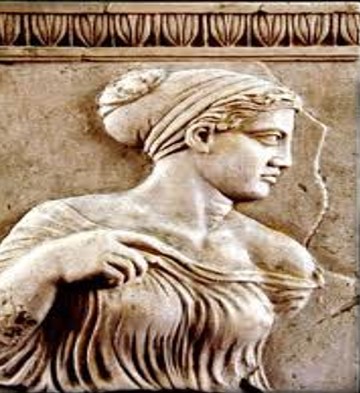BIRTH. We have two separate sources on the birth of Aphrodite, the goddess of love and beauty: One is Hesiod, the other Homer. In Thegonia, Hesiod tells that this goddess was born from the foamy waves of the sea (Greek. Aphros means foam): As Uranos puts her children born from Gaia into the bosom of the earth as soon as they are born, Mother Earth swells and suffers from terrible pains, so she gives a scythe to her last son Kronos. Kronos also cuts off his father’s balls with that scythe and throws them into the sea (Theog. 160-206):
As soon as we throw them into the choppy sea
They went right to the engine for a long time.
White bubbles were coming out of the divine limb:
A girl sprang up from this white foam.
First she stopped by the holy Kythera,
From there she went to Cyprus, surrounded by the sea.
There she landed, the beautiful goddess,
Green grass sprouted as he walked
From where your delicate feet tread.
Gods and men called her Aphrodite,
Because it was born from a foam.
According to Homer, Aphrodite was born of Zeus and Dione, daughter of Oceanus. In the Iliad, Aphrodite, who was injured in a collision with the valiant Diomedes, takes Aphrodite, her mother, in her arms, loves and caresses her, and by wiping the sap flowing from her wrist, she heals her wound and relieves her pain (Il. V, 370 et al.). Zeus consoles his troubled daughter as follows:
That’s what he said, people smiled, Father of the gods, he summoned the golden Aphrodite to him,
said:
“War affairs are not your tax, baby,
you devote yourself to the heartwarming affairs of marriage,
nimble Ares and Athena will deal with the war”.
PERSONALITY. Gold Aphrodite Homer calls this goddess, gold is about to be a measure of value. Poets describe her with other adjectives: This beautiful goddess is always “smiling”, flamboyant, coquettish and heart-warming. Homer sees the secret of this in a magical breast that the goddess carries in her white foam body. Desiring to seduce Zeus, Hera asks for this breastplate one day from Aphrodite, and calls out to her (Il. XIV, 197 ff.):
You have that love, that purchase,
that you defeated the immortals, the mortals,
Here, give them to me for today.
Aphrodite also gives the breastplate:
… untied her embroidered breastplate from her chest,
it was a mottled ribbon,
all that was charming was in it,
love was in him, desire was in him,
don’t flirt, don’t joke in it,
The love that seduces the wisest man is in him.
Symbolizing love and making love, this goddess performs this magic not by herself, but through other divine beings surrounding her. Eros is his son according to some legends, but in Theogonia Eros is a universal power born long before Aphrodite, later joining Aphrodite’s regiment (Theog. 201 ff):
When he was born and walked towards the gods
Eros and Rimeros (desire) immediately followed him.
This has been his godly share from day one
Among humans, also among the immortals;
She fell on him with their teasing, their laughing, their flirting,
The magic of love, the taste of making love.
Symbolizing beauty, grace and fertility, the Kharits, Horas, and Hymenaios, who led the wedding processions, are also the gods around Aphrodite. However, the personality of the goddess of love is portrayed as contradictory and ambiguous in the legend. From the union with the war god Ares (which is also meaningful), Phobos (defeat) and Deimos (fear), and Harmonia are born. Next to Harmonia, which means harmony, harmony, they symbolize the positive and negative sides and contradictions in the personality of fear and defeat Aphrodite. Plato expresses this duality with the most precise definition in his dialogue called “Feast”. Pausanias, one of the attendees of this feast, in which Socrates was also present, says (in Plat. Sc. 180):
“Everyone knows that love (Eros) is inseparable from Aphrodite. If Aphrodite were one, love would also be one, but since there are two Aphrodites, Love must be two. Besides, how can the duality of this god be denied? One, that is, the oldest, Aphrodite, which we call celestial, is not born from the mother’s womb, she is the daughter of the sky. There is another person who came later, the daughter of Zeus and Dione, we call her Aphrodite with the commons. we will say”.





















